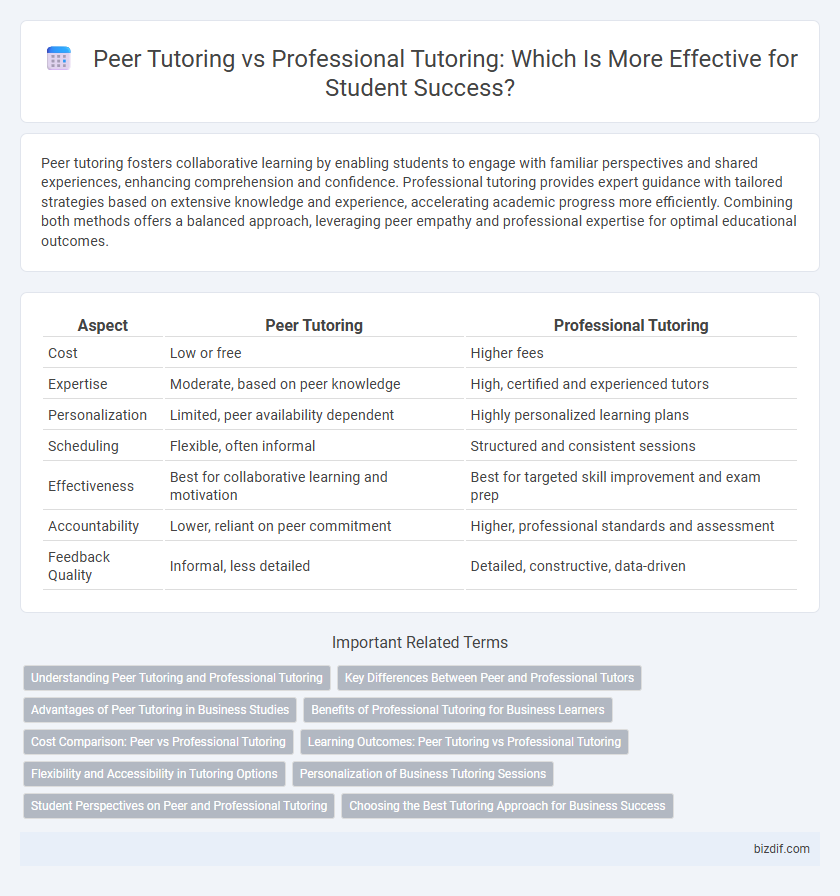Peer tutoring fosters collaborative learning by enabling students to engage with familiar perspectives and shared experiences, enhancing comprehension and confidence. Professional tutoring provides expert guidance with tailored strategies based on extensive knowledge and experience, accelerating academic progress more efficiently. Combining both methods offers a balanced approach, leveraging peer empathy and professional expertise for optimal educational outcomes.
Table of Comparison
| Aspect | Peer Tutoring | Professional Tutoring |
|---|---|---|
| Cost | Low or free | Higher fees |
| Expertise | Moderate, based on peer knowledge | High, certified and experienced tutors |
| Personalization | Limited, peer availability dependent | Highly personalized learning plans |
| Scheduling | Flexible, often informal | Structured and consistent sessions |
| Effectiveness | Best for collaborative learning and motivation | Best for targeted skill improvement and exam prep |
| Accountability | Lower, reliant on peer commitment | Higher, professional standards and assessment |
| Feedback Quality | Informal, less detailed | Detailed, constructive, data-driven |
Understanding Peer Tutoring and Professional Tutoring
Peer tutoring involves students helping classmates understand subject material through collaborative learning, fostering mutual academic growth and communication skills. Professional tutoring is provided by trained educators or experts who offer structured, personalized instruction tailored to the learner's needs, often leading to measurable improvement in academic performance. Both methods enhance knowledge retention, but professional tutoring typically delivers targeted expertise and curriculum-aligned support.
Key Differences Between Peer and Professional Tutors
Peer tutoring involves students teaching fellow classmates, often enhancing relatability and fostering collaborative learning environments, while professional tutoring features certified educators or experts providing structured, curriculum-aligned instruction. Peer tutors typically offer cost-effective and flexible support but may lack specialized training compared to professional tutors, who deliver targeted strategies based on pedagogical knowledge and experience. The key differences include tutor qualifications, instructional methods, and the level of personalized guidance, influencing the effectiveness and suitability for diverse learner needs.
Advantages of Peer Tutoring in Business Studies
Peer tutoring in business studies fosters collaborative learning by enabling students to explain complex concepts to each other, enhancing comprehension and retention. This approach cultivates critical skills such as communication, teamwork, and problem-solving, essential for real-world business environments. Peer tutors often create a more relatable and less intimidating learning atmosphere compared to professional tutors, making the educational process more engaging and accessible.
Benefits of Professional Tutoring for Business Learners
Professional tutoring provides tailored learning strategies and expert insights that align with business concepts, enhancing comprehension and practical application. Business learners benefit from structured guidance that addresses specific industry challenges and develops critical skills like strategic thinking and financial analysis. This expert support accelerates knowledge acquisition and boosts confidence, leading to improved academic and professional performance.
Cost Comparison: Peer vs Professional Tutoring
Peer tutoring offers a more cost-effective option, often priced significantly lower than professional tutoring services due to the non-expert status of peer tutors. Professional tutoring commands higher fees reflecting expert qualifications, specialized training, and personalized curriculum design, which may justify the expense for targeted academic improvement. Families seeking budget-friendly support typically favor peer tutoring while those needing advanced or subject-specific assistance invest in professional tutors despite the increased cost.
Learning Outcomes: Peer Tutoring vs Professional Tutoring
Peer tutoring often enhances learning outcomes by fostering collaborative problem-solving and communication skills, which promote deeper understanding and retention of material. Professional tutoring provides expert guidance tailored to individual needs, resulting in more structured learning paths and targeted academic improvements. Studies show that combining both approaches can maximize learning efficiency by leveraging peer interaction alongside expert feedback.
Flexibility and Accessibility in Tutoring Options
Peer tutoring offers greater flexibility and accessibility by allowing students to connect with tutors who share similar schedules and learning styles, often facilitating informal and spontaneous sessions. Professional tutoring provides structured and reliable access to expert knowledge, typically through scheduled sessions that can be customized for individual academic goals but may require more rigid timing and higher costs. Both options enhance learning opportunities, with peer tutoring excelling in adaptability and cost-effectiveness, while professional tutoring ensures expertise and consistent support.
Personalization of Business Tutoring Sessions
Peer tutoring often offers personalized business tutoring sessions by leveraging shared experiences and relatable communication styles, facilitating tailored learning approaches that adapt to the learner's pace and needs. Professional tutoring integrates specialized expertise and advanced pedagogical techniques to provide highly customized content focused on specific business skills and industry demands. Both models enhance personalization but differ in depth and scope of customized business knowledge delivery.
Student Perspectives on Peer and Professional Tutoring
Student perspectives on peer tutoring often highlight its collaborative and relatable nature, fostering a supportive learning environment that encourages active participation. In contrast, professional tutoring is perceived as structured and expert-driven, providing tailored instruction that targets specific academic needs with greater authority. Both approaches offer unique benefits, with students valuing the personalized guidance of professionals and the peer connection that enhances motivation and confidence.
Choosing the Best Tutoring Approach for Business Success
Peer tutoring provides cost-effective, relatable support by leveraging students or employees with subject expertise, fostering collaborative learning and engagement within the business environment. Professional tutoring offers specialized knowledge, structured curriculum, and accountability, ensuring consistent quality and measurable results critical for business performance. Choosing the best tutoring approach depends on balancing budget constraints, desired outcomes, and the complexity of skills needed to enhance workforce development and productivity.
Peer Tutoring vs Professional Tutoring Infographic

 bizdif.com
bizdif.com